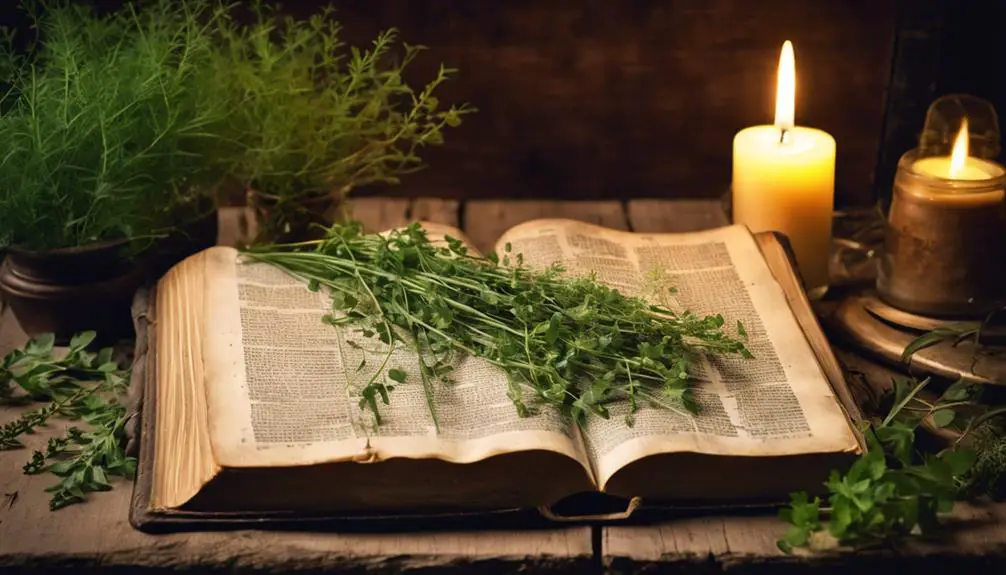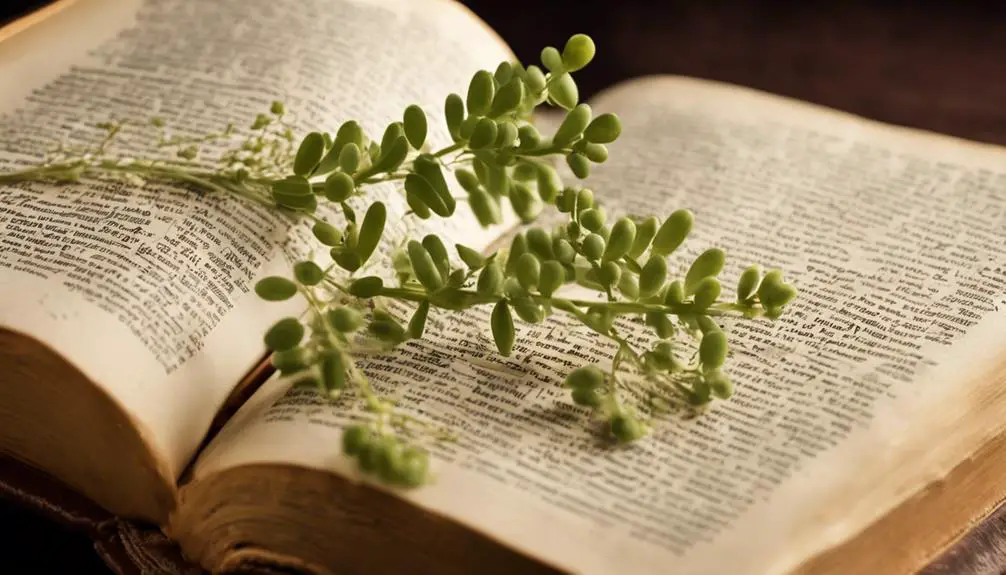Biblically bound, the Rue plant unveils a fascinating blend of symbolism and culture, beckoning us to explore its intriguing narrative.

Rue in the Bible
Peeking behind the veil of biblical text, you'd find Rue, a lesser-known but poignant symbol. Rue, a small plant mentioned in the Bible, carries intriguing cultural and religious weight.
You may be left wondering, why does such an inconspicuous herb command attention in biblical passages? Its significance is tied to the rich tapestry of meanings it holds, which we'll begin to unravel together.
Key Takeaways
- Rue's medicinal and spiritual significance dates back to biblical times, used for both healing and religious rituals.
- Biblical references, such as Luke 11:42, highlight rue's societal value and its role in critiquing religious hypocrisy.
- Rue symbolizes spiritual cleansing and truth, contributing to communal sanctification and spiritual solidarity in religious teachings.
- The usage of rue in the Bible deepens understanding of cultural and religious importance, bridging physical and spiritual realms.
Understanding the Significance of Rue

Why is rue significant in biblical context, you may ask? To grasp this, we'll delve into two key aspects: Rue Medicinal Use and Rue Folklore Origins.
Rue, scientifically known as Ruta graveolens, has a rich tradition of medicinal use. You'll find it fascinating that this plant, often mentioned in the Bible, has been used since ancient times for its potent healing properties. It was commonly applied as an antispasmodic, an antidote to poison, and a treatment for digestive issues. Its strong aromatic nature also made it a popular choice for warding off pests.
Peering into Rue Folklore Origins, you'll see that rue's significance extends beyond its medicinal uses. It's deeply embedded in various cultures and religious practices, including Christianity. In biblical times, it was often associated with regret and sorrow, but also protection and cleansing. This complex symbolism stems from its bitter taste, giving it a dual representation of both the hardships and hopes of life.
Biblical References to Rue

Now that you've understood rue's medicinal significance and folklore origins, let's explore how this plant features in the Bible itself. Rue is mentioned in Luke 11:42, where Jesus criticizes the Pharisees for tithing herbs, including rue, but neglecting justice and the love of God. Here, the emphasis isn't on rue itself but on the Pharisees' misplaced priorities.
However, the context of this mention provides insight into Rue's use during Biblical times. It shows that rue was among the herbs that were tithed, indicating its importance in the society. This aligns with the known uses of rue, particularly Rue's Medicinal Use. The plant was likely valued not only for its healing properties, but also for its spiritual implications.
Furthermore, the Pharisees' tithing of rue suggests the plant had a role in their religious practices. This highlights Rue's Spiritual Properties beyond its medicinal benefits. As you delve deeper into the biblical references to rue, you'll find that its significance isn't merely physical but also spiritual, a testament to the plant's multifaceted role in ancient societies.
Symbolism of Rue in the Bible

Delving into the symbolism of rue in the Bible, you'll uncover a rich tapestry of meaning woven into the fabric of this humble herb's story, reflecting its spiritual and socio-cultural significance in ancient times. Rue, a plant known for its medicinal value, was also a powerful spiritual symbol.
Interpreting Rue's healing properties, you'll find that it wasn't just a physical curative, but a metaphor for spiritual healing. It was believed to cleanse the soul, purify the heart, and ward off evil, reflecting its spiritual implications. The herb's pungent aroma was thought to represent the strong, sometimes harsh, truth of God's word— a signal to the believer to endure the bitter with the sweet in their spiritual journey.
In a broader socio-cultural context, rue's symbolism extended beyond individual spirituality. As a common element in purifying rituals, it symbolized communal sanctification and spiritual solidarity. Thus, rue served as a tangible link between the physical and spiritual realms, manifesting the divine in the everyday.
Rue in Jesus' Teachings

Shifting our focus to the teachings of Jesus, you find that rue takes on a rather critical role, particularly in the context of religious hypocrisy. Rue's metaphoric use in Jesus' teachings is both profound and somewhat controversial.
Jesus' Rue Mention occurs in Luke 11:42, where He criticizes the Pharisees for tithing on herbs like mint, rue, and all kinds of garden herbs, but neglecting justice and love of God. Here, rue signifies the trivial matters that religious leaders focused on, overlooking weightier issues of morality and spirituality.
Analyzing Rue's Metaphoric Use, it's clear that Jesus uses rue as a symbol to highlight the hypocrisy of religious leaders. They were meticulous in tithing minor herbs but neglected the more important aspects of the law: justice, mercy, and faithfulness.
Passage |
Interpretation |
|---|---|
Luke 11:42 |
Rue represents trivial religious practices overemphasized at the expense of justice and love of God |
Rue's Metaphoric Use |
Symbolizes religious hypocrisy, focusing on minor rituals while neglecting moral and spiritual duties |
Understanding the biblical significance of rue, particularly in Jesus' teachings, offers a deeper understanding of His criticism of religious hypocrisy.
The Cultural Context of Rue

To fully grasp the significance of rue in biblical texts, it's crucial to examine the cultural backdrop of the time, taking into account the societal norms, beliefs, and practices that influenced its symbolic interpretation. Rue's ancient uses were multifaceted, revealing its cultural importance. It wasn't only employed for its medicinal properties but was also used in various religious rituals, signifying purification and protection.
Rue's botanical features further enhanced its symbolism. Its hardiness and resilience, able to thrive in poor soils and harsh conditions, mirrored the endurance that was highly valued in the societies of the time. The perennial nature of rue, signifying renewal and rebirth, resonated with the biblical themes of redemption and salvation.
The cultural significance of rue was deeply entwined with its practical uses and botanical characteristics. This understanding provides a richer perspective on the biblical references to rue, revealing layers of meaning that are often overlooked. So, as you delve into the biblical text, remember to consider the cultural context of rue. It's a potent reminder that every plant, every word, and every symbol in the Bible has a depth of meaning shaped by the culture and times in which it was written.
Frequently Asked Questions
How Can I Grow Rue Plants in My Own Garden?"
You can grow rue plants in your garden by using proper rue propagation methods. Start by planting seeds or cuttings in well-drained soil. Ensure they're in a sunny spot, as rue thrives in sunlight.
Regularly water them, but don't overdo it. When the plants mature, use appropriate rue harvesting techniques. Remember to wear gloves as rue can irritate your skin.
With patience and care, you'll have your own rue plants flourishing in no time.
Are There Any Health Benefits or Medicinal Uses of Rue Mentioned in the Bible?"
You're curious about rue's medicinal uses and health benefits as mentioned in the Bible. However, the Bible doesn't specifically highlight these aspects. Instead, it mainly discusses rue symbolism and Biblical interpretations. It's often associated with regret and repentance.
As for its health benefits, it's better to refer to modern herbal medicine resources for more accurate and scientifically proven information. Remember, interpretations can vary, so it's interesting to explore different perspectives.
What Are Some Other Names for Rue in Different Cultures or Languages?"
You're asking about alternate names for rue in various cultures or languages. Rue, known for its symbolism in art and culinary uses, carries different names worldwide.
In French, it's called 'rue officinale,' and Italians refer to it as 'ruta.' The Spanish name is 'ruda,' while in German, it's 'raute.'
Each name reflects the unique cultural interpretations and applications of this versatile herb.
Is Rue Mentioned in Any Other Religious Texts Apart From the Bible?"
Yes, rue isn't only mentioned in the Bible. It's found in other religious texts too. You'll find rue symbolism in various cultures, often associated with protection and purification.
In Greek and Roman myths, it's tied to regret and repentance. It's also present in Islamic traditions; some say it's used in protective amulets.
How Can I Incorporate Rue Into My Personal Religious Practice or Rituals?"
You can incorporate rue into your personal religious practices or rituals by understanding its symbolism and creating rue recipes. Rue's symbolism relates to regret, sorrow, and protection, so you could use it in rituals for repentance or safeguarding.
Consider making a rue-infused oil for anointing or a rue tea for purification rituals. It's crucial to research and respect the plant's historical context while tailoring its use to your own spiritual needs.
Conclusion
So, you've seen how rue, though not as prominently mentioned as other plants in the Bible, carries significance. Its biblical references, symbolism, and inclusion in Jesus' teachings all point to a nuanced interpretation.
Understanding rue's cultural context further enhances its relevance. Despite its obscurity, rue in the Bible serves as a potent symbol and a tool for teaching, shedding light on the complex layers of biblical text and interpretation.



Sign up